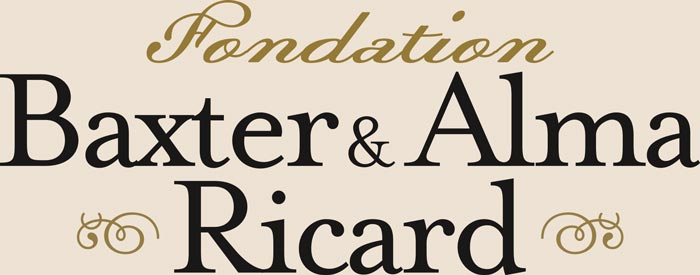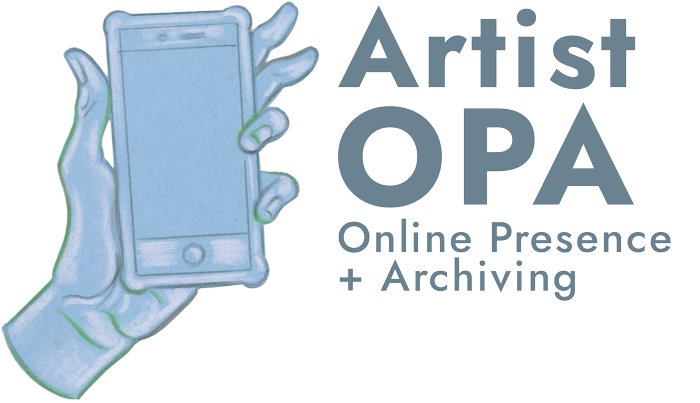D.5 Room for Everyone: Opening Doors for Artist-parents and Their Families
Fri Oct 20 / 15:15 – 17:00 / KC 205
chairs /
- Sarah Cullen, MOTHRA: Artist-Parent Project
- Kerri-Lynn Reeves, MacEwan University, MOTHRA
Over the last ten years a discussion has developed around how artist/academic-parents can achieve parity with artists/academics who are neither parents nor caregivers. For the most part this has been happening online, but it has been slowly making its way into exhibitions, into print, and into artist residencies.
To be taken seriously in most fields you are expected to sever links with personal relationships – such as family – in order to achieve success. This roundtable discussion features participants who interrogate why we persist with this patriarchal mode of working. Why do we still demand “a room of one’s own” even when this is either unattainable or undesirable to many? Is there no value and inspiration in messy, vulnerable, interrupted, shared spaces, and the collective life that takes place there? How does art change when we admit to these conditions, and to our lives as carers?
keywords: artist-parent, collective, intersectional-feminism
session type: roundtable
Sarah Cullen (she/her) is an artist based in Toronto. She has a BFA from OCADU, and a MA Geography, University of London (UK). She has exhibited in Toronto and internationally, and has participated as an invited artist on a number of artist residencies, as a solo artist, with her partner, and with her children. She is the founder of MOTHRA: Artist-Parent Project. Since 2018 MOTHRA has been funded as an art project, residency program, and sector innovator. Thanks to CCA funding Sarah is spending 2023 conducting practice-led research on the ways in which care work (especially artists who are primary caregivers of children) affects art. MOTHRA is situated within the wider international discussion around care-work and art practice within a contemporary art context and its affiliated institutions. Sarah’s practice has focused on walking as a method. In 2007 she received the Sonia de Grandmaison Bursary to attend the Walking Art residency at the Banff Centre.
Kerri-Lynn Reeves (she/her) is an interdisciplinary artist, educator, and mother originally from rural Manitoba, where she grew up as a European-Canadian settler on Treaty 2 land. At the heart of it, her work explores the relationship of the social and the material through the use of spatial, relational, and craft practices. With a commitment to blurring the lines between life and art, Reeves earned her Master of Fine Arts – Studio Arts in Fibres and Material Practices from Concordia University in 2016 with her first child strapped to her chest. Reeves, now a mother/step-mother of four, continues to explore the confluences of her art making, teaching, and parenting practices. Reeves is a tenure-track Assistant Professor in Studio Arts at MacEwan University in Edmonton, AB, (Amiskwacîwâskahikan), Treaty 6 Territory.
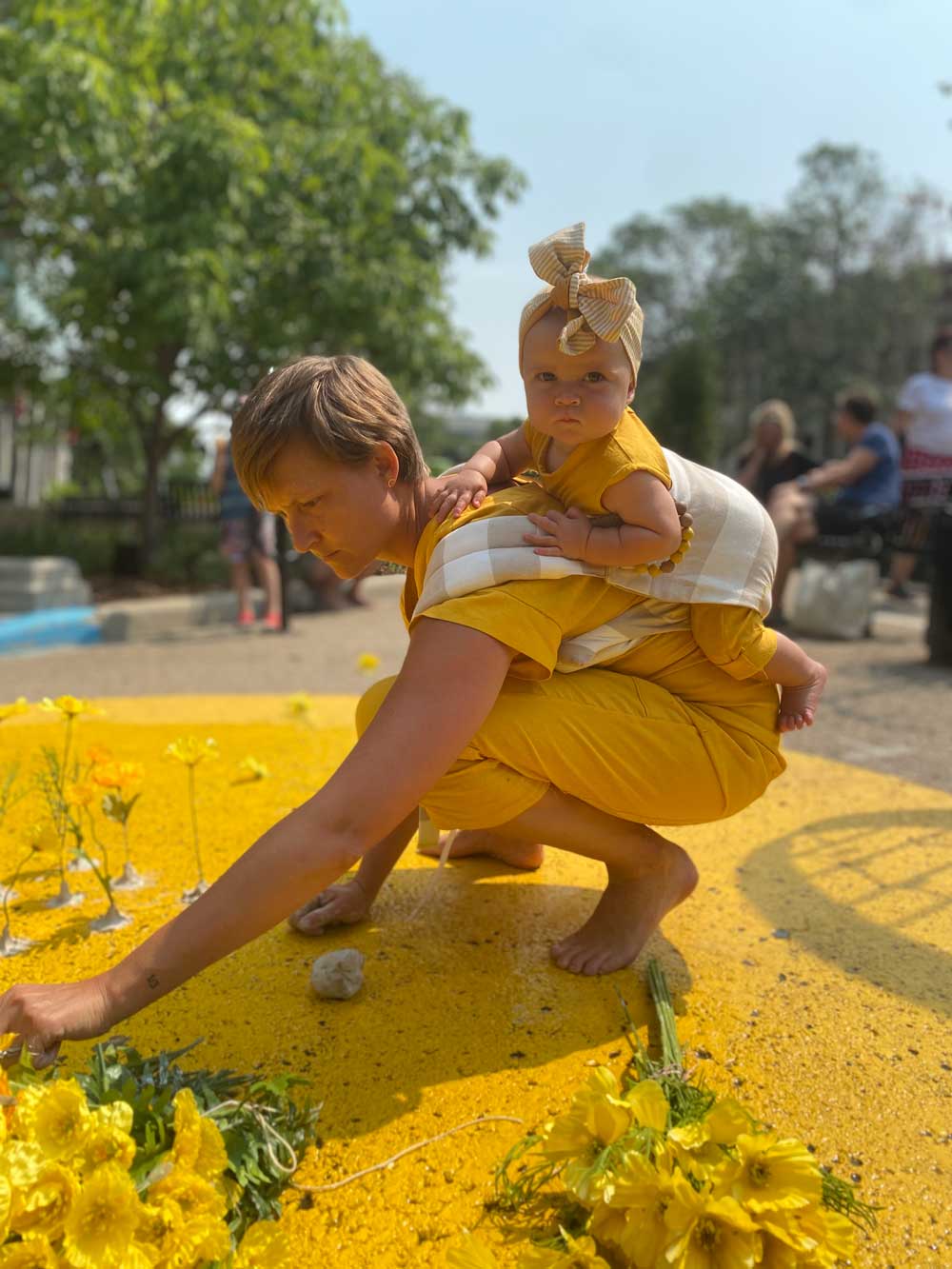
Bowd, A, Duet (Don’t wake the baby), performance still: 12ft circular quilt, 2022
Not a Proposal
- E.M. Alysse Bowd, Red Deer Polytechnic
I feel excited to have become a Mother at a time when I see the start of spirited conversations and work about Motherhood being had and made. I became a Mother in September of 2020 only a few months into the Global Pandemic and it seemed unavoidable that my artistic work not engage with the parallels between those experiences – codependency, isolation, escapism, presence, forced stillness, walking in circles, grief, and submission – a state of contradictions.
Since then I have returned to my instructional positions at Red Deer Polytechnic and the City of Red Deer to round out the title of Artist, Academic and Caregiver. In reading your call for participants I felt eager to get to ruminate on these ideas outside of my own head. I began to imagine moments where I have brought my child and breastfed my child in department meetings, have had her by my side as I install student exhibitions or volunteer in various capacities on campus, or simply let her nap under my desk as I grade portfolio’s as gentle interrogations of the patriarchal institutional mode you speak of.
Interruption has been a powerful word in my postpartum existence and I identify with your call to not simply model myself after the institution but rather think about viability, feasibility and desired outcomes and how I can at times distort or challenge the comfortable social norms in order to create new examples for my self, my students and my peers of how caregiving can positively shift and belong in many environments. Very early in my mothering experience, I felt passionately the necessity to include her in my life rather than have to leave her in order to access my professionalism. This inclusion in my studio, and at times my classroom and my office echos the interruption of thought, speech, sleep, physical privacy and simply life that comes with having a toddler.
keywords: motherhood, performance, inclusion
E. M. Alysse Bowd holds a BFA in Ceramics from the Alberta University of the Arts (formerly the Alberta College of Art + Design) in Calgary and an MFA from NSCAD University in Halifax, Nova Scotia. She navigates an interdisciplinary creative practice of object making, drawing and performance art with a focus on nonlinear narrative, female perfectionism, self-care and motherhood mythology. Her use of metaphor, ritual and labour explores fundamental relationships between the self and domestic culture, the psychology of daily routine, and the alienation of the individual. Alysse Bowd is a recipient of numerous awards, scholarships, and commendations for her contributions to contemporary visual arts. She has participated in several artist residencies in Canada, Denmark, Hungary, Iceland, Finland, and in Australia. Since becoming a Mother to Coco Lovely in 2020, she has explored Mother + family residences in Portugal and will be working at the Centre for Ceramics in Berlin, Germany in the spring of 2024. Bowd maintains a studio practice in Red Deer, where she enjoys teaching part-time at the Red Deer Polytechnic in Drawing, Foundation and Creativity courses alongside instructing a plethora of community children's programs in creative exploration. Bowd’s body of works and multi-media installations have been the subject of several solo and group exhibitions that were held across Canada and abroad. Her current work will be seen in Nuit Blanche Saskatoon in September 2023 and a Solo exhibition at the Art Gallery of St. Albert in the summer of 2024.
Weaving it Together: Seeking Forms of Community in Art, Work, and Family Life
- Noni Brynjolson, University of Indianapolis
In January 2020, I began a new job as an Assistant Professor of Art History at the University of Indianapolis, after having recently completed my PhD. On my first day, I said goodbye to my husband and three-month-old baby, and went to work with breast pump in hand. I was shown to an office space that was shared with two male co-workers—wonderful colleagues and fathers themselves, but not the ‘room of my own’ that I was expecting to be able to use for pumping milk throughout the day in between teaching duties and meetings. This is one of the many examples of how teaching, academic research and family life have been woven together in the past three years for me. For this roundtable discussion, I propose to reflect on these experiences and the pressure I have felt to keep my academic career separate from family life in order to succeed. The idea of creating shared spaces and forms of collectivity that merge family and career, and that challenge capitalistic and patriarchal modes of working, is one that resonates strongly with me. Alongside personal reflections, I would bring my experience researching socially engaged art practices to this discussion—including examples that are community-based and that interrogate the lack of social safety net experienced by many working families. Finally, an additional perspective I would bring to this discussion would be to offer comparative examples between Canada and the United States, since I am Canadian but have lived in the US for the past ten years, and have raised my kids in Indiana—a state that is hostile to the very concept of a social safety net.
keywords: art history, socially-engaged art, social safety net, collectivity
Noni Brynjolson is an Assistant Professor of Art History at the University of Indianapolis. Her research focuses on collaborative public art projects and examines themes of repair and construction. Noni is a member of the editorial collective of FIELD: A Journal of Socially Engaged Art Criticism and her writing has appeared in FIELD as well as in the edited books Desire Change: Contemporary Feminist Art in Canada, and The New Politics of the Handmade: Craft, Art and Design.
Roundtable Participation
- Catherine Chan, University of Guelph
I’m inspired by the growing community of artist-parents who are sharing how their life and creative endeavours encompass the joys and challenges of caring for kids. Much of the artworld still isn’t structured to be inclusive for caregivers of younger kids (eg. openings in the early evening (around kids’ bedtime), lack of physical and social spaces for breastfeeding, residencies for solo artists) and in academia, it is notably challenging to establish oneself if you’re a primary caregiver.
I’m currently an MFA (Studio Art) candidate at the University of Guelph, continuing a career change and academic path that was put on hold for twelve years because I didn’t see a way at the time to be a mom and artist/student. I love being a mom to my two daughters, Kennedy (six years old) and Alex (eleven years old)—learning from them and guiding them. I also remember the worry and fear I had in my first pregnancy that becoming a mother meant I’d be losing myself as an artist. As a woman of Chinese heritage growing up with cultural expectations that steered me toward more stable and traditional careers, I had very few role models to look to for guidance on how to be an artist-mother. I’m now in my mid-forties. Returning to grad school last year was a decision inspired by my kids. I’m making this an opportunity to have them be a part of my program: talking to them about my projects, having them attend visiting artist lectures, bringing them into my studio space to realize their ideas too, having them join me at exhibition openings, and having them get to know other students, artists, and faculty. My hope is for them and others (fellow students, other artists, other parents) to expect that people could and should be able to have fulfilling lives as carers, creatives, and academics. For this panel, I am keen to discuss with others how the world needs more vulnerability and sensitivity—not less, how to continuing working toward this openness, and how this not only makes for more meaningful art but also more meaningful ways to relate to one another.
keywords: artist, mother, care, reciprocity, repair
Catherine Chan is a transdisciplinary artist whose work explores the intersection of social and ecological change on human and geologic timescales. Her primary mediums are installation and photography, through which she uses narrative approaches to visualize philosophies of repair, reciprocity, and the ethics of care. She holds a BFA in Photography from Emily Carr University of Art + Design, an MSc in Soil Science from the University of Guelph and is currently completing an MFA in Studio Art at the University of Guelph.
Catherine investigates how art can be a form of storytelling, dialogic, and experiential communication to influence perceptions of social and ecological impacts of the Anthropocene. Using gestures of mending, her practice explores the ongoing legacies of ecological degradation and colonial expansion in Canada on personal, cultural and collective levels while working through complex emotions of absence and presence, loss and memory, futility and hope.
Remembering Your Face When I Drop You Off At School
- Megan Hildebrandt, University of Texas at Austin
In 2019, I began a new body of work entitled Remembering Your Face When I Drop You Off At School, when I was 9 months pregnant with my second child, and my oldest had just turned six. I started the drawings as a reaction to the continued mass school shootings that have marked my own life, and now the life of my children.
I know that becoming a mother changed my work. I can point to shifts in the content, style, concepts which I explored after becoming a parent. I also know that becoming a mother has made my work richer, my process eruptive and sometimes rushed, my sense of self expansive yet split: when am I a half-attentive mother, when am I a half-attentive artist?
Earlier this year, I moderated a panel entitled Making, Motherhood and Mental Health for The Contemporary Austin. The title may imply that these topics are separate—yet in reality, we all know there are no boundaries in between the three. There is chaos, malleability… a lack of clarity. When are you a mother, when are you making, when are you taking care of your mental health? For me, it all seems to swirl around and happen simultaneously.
Being a parent of young children during a global pandemic has completely shifted the way I understand time. When you have a child, your whole understanding of time shifts dramatically. I want to know how others’ senses of time—psychic or physical time—have shifted in the work and in their making process. I feel a deep need to connect with other artist parents to understand how they experience the rich fracture of identities we share.
keywords: pandemic, psychic time, mental health, gun violence
Megan Hildebrandt received her BFA from the Stamps School of Art & Design in 2006, and her MFA in Studio Art from the University of South Florida in 2012. Hildebrandt has exhibited nationally and internationally, including: The Painting Center, New American Paintings, The Baltimore Museum of Art, The Museum of Contemporary Craft, Arlington Arts Center, Detroit Contemporary, HEREarts Center, Latitude 53, Johns Hopkins Medical Center, the LIVESTRONG Foundation, Hyde Park Art Center, The Torpedo Factory, and Collar Works.
In 2018, Hildebrandt received an Art Works grant from the National Endowment for the Arts for the Aesthetics of Health Course she developed for Interlochen Arts Academy. In 2022 Hildebrandt co authored an article about adapting the Aesthetics of Health curriculum effectively for higher education during the pandemic in the American Medical Association Journal of Ethics. This course is now taught each spring at the University of Texas at Austin. In early 2023 she moderated a panel entitled “Motherhood, Making and Mental Health” at The Contemporary Austin.
An artist, educator, and arts-in-health advocate, Hildebrandt currently lives and works in Austin, Texas, where she is Associate Professor of Practice in the Department of Art and Art History at The University of Texas.
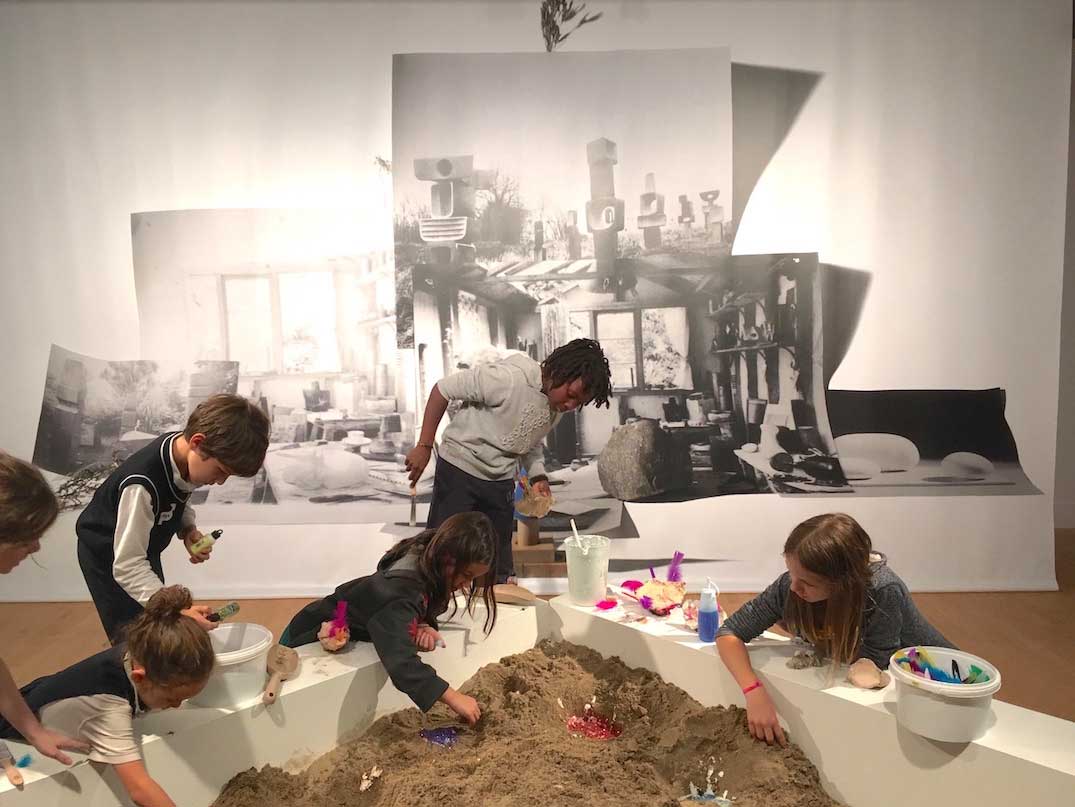
Leisure (Carruthers, M & Wesley, S), Conversation with Magic Forms, VU Photo, Québec, QC, 2017
My Studio Was a Jumble of Children and Rocks: Making a Mess in Life, Work and the Art Gallery
- Leisure (Susannah Wesley & Meredith Carruthers), Concordia University
The first thing most young visitors learn when they visit an art gallery is “do not touch,” a directive that is contrary to non-visual perceptions key to children’s agency and imaginations. Within this round table, we present concrete methods of creating welcoming and active exhibition environments for children.
In our nearly 20 year collaborative practice, collaboration has driven the subjects and material outcomes of our work. With the entrance of children into our lives, a dramatic shift took place in our practice, particularly in our ways of relating to objects and materials. Through modes of touching, spilling, spooling and stringing, our recent projects have collapsed aspects of studio production and gallery reception, creating new ways to engage child publics often sidelined in traditional exhibitions. As part of this round table we demonstrate, The Feel of Materials: A Relational Tool Belt, a set of sensory experience pockets made from repurposed textiles. This project draws on our lived experiences as mothers emptying children’s collections from pockets and hearing about their charged significances, as well as our current PhD research on “loose parts play,” expressed by Simon Hepworth Nicholson (1934 – 1990) as a system of movable variables to inspire and support creative agency (Nicholson, 1971). Within the contrasting pockets of The Feel of Materials, bioplastic balls and other matter is manipulated and felt within different volumes, creating two simultaneous yet differing stereognostic experiences. In this way, a defined set of material variables experienced in relation creates new multisensory knowledge for the participant.
keywords: collaboration, inclusion, relational, tactile
Leisure is a research-based collaborative art practice between Montreal-based artists Meredith Carruthers (1975) and Susannah Wesley (1976). Working together under the name “Leisure” since 2004, their approach includes archival research, interviews with artists, site visits, and extending their collaboration to include their historical subjects, family members and community participants. The resulting projects are multidisciplinary in format—from workshops, to published texts, interactive installations, and object-making. Recent projects on collaboration, gesture and spatial narrative include: Having Ideas by Handling Materials (Oakville Galleries, 2023), The Ceremony (Foreman Art Gallery of Bishop’s University, 2021), Conversation with magic forms (most recently exhibited at CAG Vancouver, 2020), the solo retrospective How one becomes what one is (Musée d’art de Joliette, 2018), Panning for gold/Walking you through (Musée d’art contemporain de Montréal, 2017) and Dualité/Dualité (Artexte, Montreal, 2015). Wesley and Carruthers are currently working on a precedent setting collaborative PhD candidacy within Concordia University's Individualized program.
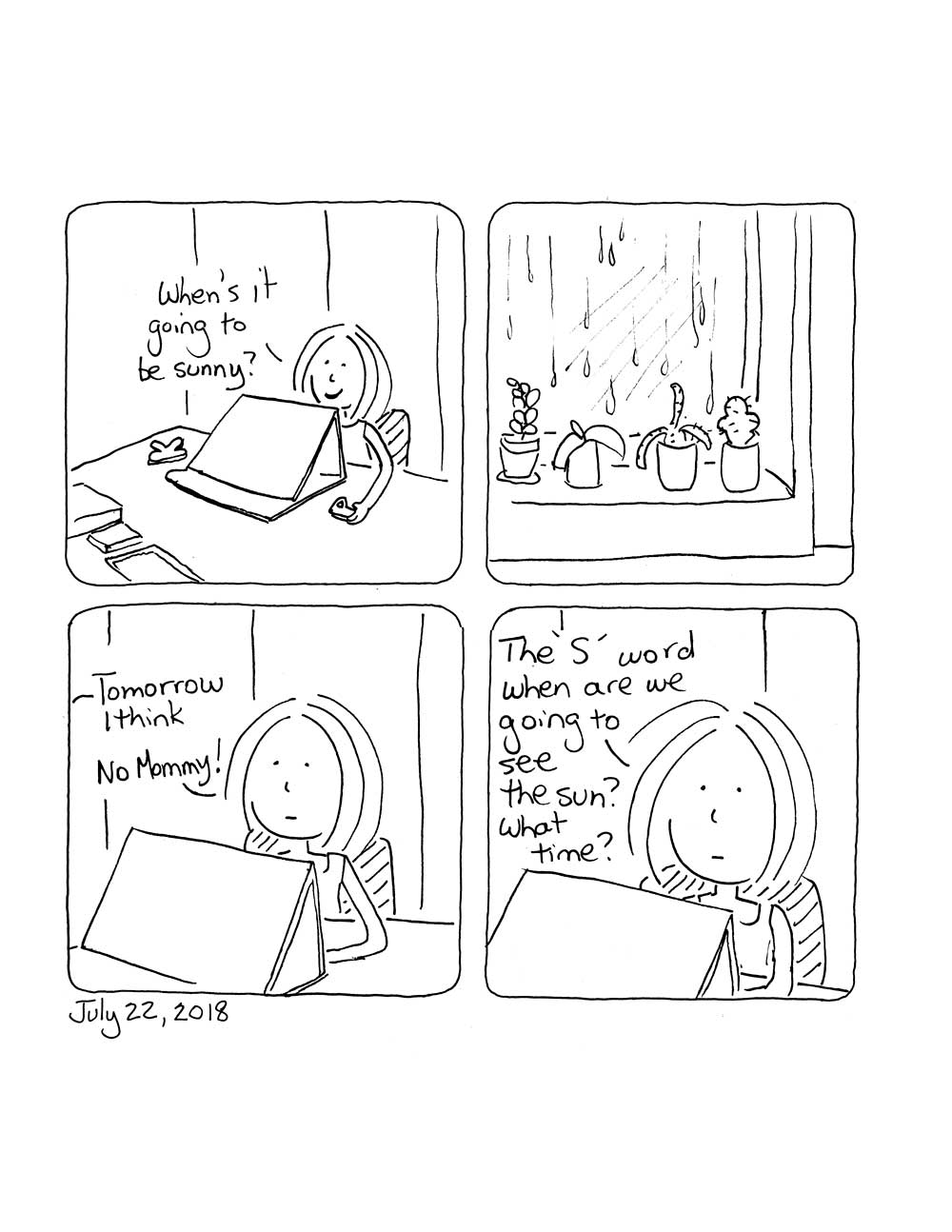
Purcell, J, The S word, archival ink on paper, 7"x7", 2018.
Comics and Collaboration in the Kitchen
- JoAnn Purcell, Seneca College
This project is a critical engagement with the operations of authorship and collaboration with my daughter Simone who was born with the genetic difference Down syndrome (an intellectual disability). For three years I drew a four-panel comic every day from May 2016 to May 2019 to the accumulation of 1085 pages of comics. My intention is to amplify her voice, to share her intellectual, affective, and communicative differences, and significantly, to share without speaking for her. I am guided by the Disability Rights movement mantra, “Nothing about us without us.” I would draw at the end of the day on my long kitchen counter after the detritus of dinner was cleared. I would take no more than forty-five minutes to create the entry. I distilled our exchanges to a single page with focused and increasingly unbiased attention to what seemed to be Simone’s focus. I did not record the narrative of our life, most of which happened outside the frame of the comics. Through the intersection of comics creation and caregiving, I brought my artistic and academic practice into my home and found the making and the caring blurred into each other. Observing and drawing made me notice the small but important details which informed my caregiving which in turn was materialized on paper.
Various iterations of this project have been published (Biography, UHawaii Press, 2021) and is currently in the final stages of bringing it to single author book form under the generous guidance of Wilfrid Laurier University Press.
keywords: comics, caregiving, disability, collaboration, everyday
JoAnn Purcell, PhD (Critical Disability Studies, York U) uses comics as a research method to inquire into disability and difference. She is the current and founding Program Coordinator of Illustration at Seneca College. As Faculty she teaches drawing, painting, colour theory, art and illustration history. A lifelong learner, she also has a MA in Art History from York University, a BScN from the University of Toronto and is a graduate of the Ontario College of Art. Recent publications include “Disability Daily Drawn: A Comics Collaboration” in Graphic Medicine (U Hawaii Press, 2022), and “Comics, Caregiving and Crip Time” in Comics Picturing Girlhood (Leuven U Press, 2022). Her dissertation will be published by Wilfrid Laurier U Press. She has years of hands-on experience as a visual artist, animator and visual effects artist and previously, psychiatric nursing.
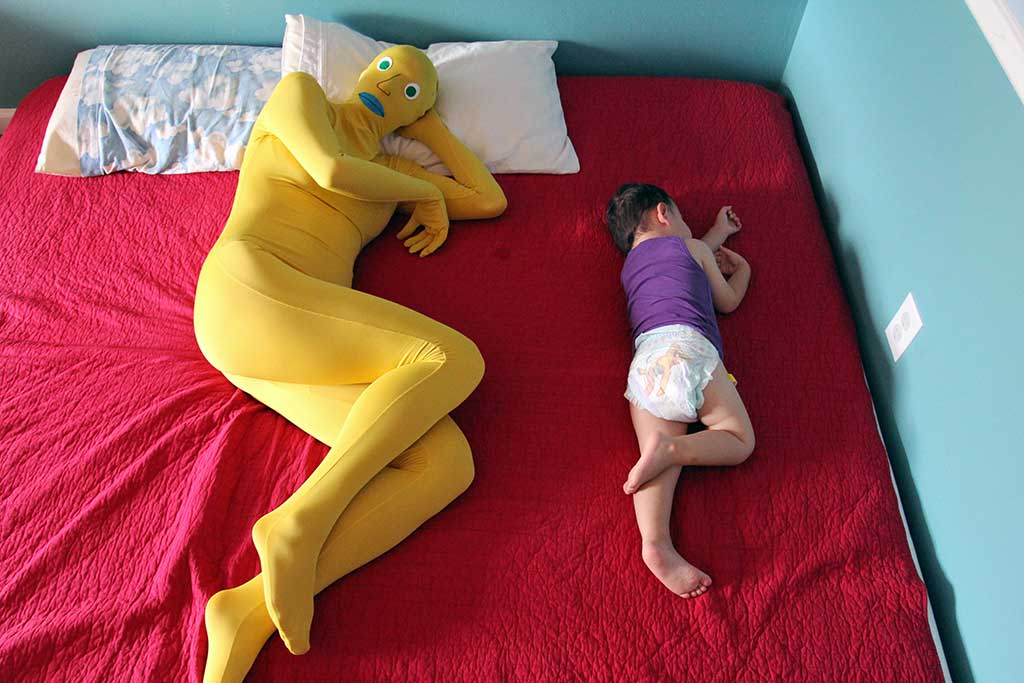
White, E, Nap Time, performance photography. 12” x 18”, 2015.
One With the Mess
- Emilia White, York University
“One With the Mess” is the title of a photograph I took for my participatory photography project, Parent Skins. In the photograph I’m lying face up under a messy children’s table that is overflowing with toys. My face and body are concealed by a yellow bodysuit that looks like an alien. The photograph humorously depicts the alienation that I felt from my own identity after becoming a parent. Even nine years later, I struggle regularly with the loss of my “pre-kid” self. The photographs in my Parent Skins series, which were created by myself and other parent participants, reveal the collective effort of raising children. We are all in this together, even when we are isolated at home doing the impossible task of trying to get our children to brush their teeth and take a bath before bed. This summer I’m transitioning to a new position as Assistant Professor and Program Coordinator of Integrative Arts at York University in Toronto. My children, of course, will be coming along with me. I will continue to find ways to integrate my children into my creative and professional life. Participating in the MOTHRA roundtable at the UAAC/AAUC conference will allow me to connect with other parents who are in similar situations, and contribute to the conversation about how things could change more positively for all. Through collective dialogue and advocacy, it is possible to re-frame the conversation to include indirect, messy, and vulnerable methods of success and productivity.
keywords: parenthood, vulnerability, artist/parent, performance, photography
Emilia White is an interdisciplinary artist working in performance, video and fiber arts. She recently accepted the position of Assistant Professor and Program Coordinator of Integrative Arts at York University School of the Arts, Media, Performance & Design (AMPD), after teaching as a Lecturer at the University of Michigan Stamps School of Art & Design. Currently, Emilia’s research focuses on an autoethnographic exploration of female embodiment and motherhood. Her work has been presented at Collar Works, Defibrillator Gallery, Museum of Contemporary Art Detroit, Planet Ant Theater, University of Michigan Museum of Art, Dumbo Arts Festival, Chicago Women’s Funny Festival, and Gallery Salihara, among others. She has presented her work on numerous occasions at the SECAC conference in the US. Her “Parent Skins” series will be presented in a traveling exhibition titled Self Adjacent in Fall 2023, curated by Tracy Stonestreet and Sarah Irvin.
Roundtable contributor
- Marlene Yuen, Staff, Artist, Emily Carr University of Art + Design
I would like to share my experiences as a parent artist. Being an artist and parent are two very difficult roles, but I made room for my practice to happen. More recently, I participated in the artist residency, MOTHRA, facilitated by Sarah Cullen. It was a wonderful experience for my family. The artworks made, cyanotype prints, during this time was recently included in an exhibition at Martha Street Studio, WOW MOM. This large volume and scaled exhibition focused on the constraints and repetition of tasks that parent artist deal with. While making artworks for WOW MOM, it was a mix of accessing a printmaking studio for a few hours away from my family and time spent with my family. All artworks were integral to the exhibition, but many people responded positively with the artworks made during my time at MOTHRA.
keywords: parent-artist, printmaking, studio time
Marlene Yuen (she/her) is a multidisciplinary artist who lives and works on the unceded and ancestral home territories of the xʷməθkwəy̓ əm (Musqueam), Skwxwú7mesh (Squamish) and Səl̓ílwətaʔ/Selilwitulh (Tsleil-Waututh) Nations. Her current focus is on illustrations, comics and handmade books. Marlene’s artist books have been retained in special collections archives nationally and internationally. She has created artworks about Vancouver’s historic Chinatown and Chinese Canadian workers for museums, galleries and public art programs. In 2021, her book, Ho Sun Hing Printers, received an honourable mention from the City of Vancouver Book Awards program. It is about Canada’s first Chinese-English letterpress print shop.
Marlene works as a studio technician at Emily Carr University of Art & Design. She is also known as Ada’s mom.
